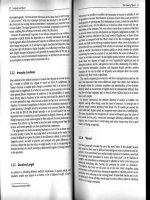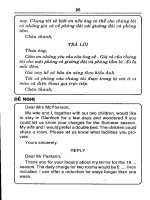getting a job features of non literal english part 4
Bạn đang xem bản rút gọn của tài liệu. Xem và tải ngay bản đầy đủ của tài liệu tại đây (474.26 KB, 3 trang )
Talk a Lot
Getting a Job
Features of Non-Literal English – Part 4
1. ALLUSION
An allusion is an indirect reference to something used instead of the direct truth. Both listener and
speaker usually know what is really meant by the allusion.
Example:
“I heard that Susan has taken the kids to her mother’s again.” [You both know that Susan’s husband is
having an affair, and that they are on the verge of breaking up. This sentence refers to their marriage
problems: Susan has taken her kids to stay with her mother, because they can’t live in the family home
together at the moment.]
When:
When the topic may be embarrassing or delicate – something that you want to avoid talking about
directly, e.g. a personal problem, or something connected with money or sex.
2. METAPHOR
A metaphor is a statement that compares somebody or something to something else, by saying that
they are that thing. A metaphor makes somebody or something into a symbol representing something
else.
Example:
“Alison – you know, you’re my rock. I can’t live without you.”
[i.e. “Alison, you are not literally a rock, but you are a very supportive person. I feel safe and secure
when I’m with you – as I would were I to be standing on a rock in the middle of a raging river. Therefore,
you symbolise “security” to me. Thank you.”]
When:
We can use metaphor when literal English is too prosaic or ordinary, and not capable of expressing the
strength and depth of our feelings, or what we want to say.
3. PHRASAL VERBS
See Unit 1: Hotel – Features of Non-Literal English – Part 1
4. SARCASM
Sarcasm occurs when a speaker makes a statement that is obviously not true, in order to draw attention
to the truth, and at the same time to insult somebody or cause offense.
Example:
[A woman you don’t like comes to a party at your house, wearing a dress that is two sizes too small for
her and makes her look terrible. While your friends are watching, you say to her:]
“Oh! That’s a nice dress!”
[What you mean, and what everybody understands: “Oh! You look awful!”]
When:
Sarcasm is a deliberate and open form of insincerity. You could use it when you want to openly offend
or be rude to somebody, by drawing attention to their faults or weaknesses, particularly when compared
to your own – far more abundant – attributes and achievements.
Sarcasm is similar to irony (see Unit 3: Media), but more explicitly cruel. We could call it an unkind form
of irony.
36
Talk a Lot
Getting a Job
5. SLANG
See Unit 2: Problems – Features of Non-Literal English – Part 2
6. FLIGHTS OF FANCY
A flight of fancy is a blatantly untrue “tall” story that you make up spontaneously, in which you imagine
yourself involved in impossible or highly unlikely events. The purpose is to illustrate the truth of the point
that you wish to make, while entertaining your listeners and perhaps making them laugh.
Example:
“Are you scared of wasps, Greg?”
“No, I’m not afraid of wasps, but, I’m telling you, if that wabby [slang for “wasp”] comes anywhere near
me, I’m going to show it no mercy [cliché]. I’ll take it out [kill it] and post the remains of the deceased to
its family along with a little note: don’t mess with the Greg-meister!” [nickname]
[What he means:] “Yes, I am scared of wasps, and if I kill this one, I’ll feel really proud of myself.” [i.e. he
is not really going to treat the wasp as if it were human.]
When:
People use flights of fancy when they enjoy inventing humorous situations and describing them, or
acting them out, for other people’s pleasure and amusement – or as a way of drawing attention to
themselves. The idiom “to go off on one” describes this process, e.g. “We were chatting to Josh last
night, and he went off on one about his boss’s mistress…” Literally: “We were chatting to Josh last night,
and he told us a far-fetched story about his boss’s mistress…”
7. IN-JOKES
An in-joke is a private joke that only a select group of people can understand and therefore find funny.
Example:
In an office there is a desk that is known by the workers there as “the desk of doom”, because two years
earlier the person who used to work there was fired for having an affair with the boss’s daughter, and
soon afterwards was killed in a horrific road accident. Since then it has acquired the morbid nickname,
and new members of staff are always deliberately given that desk, making the rest of the staff laugh.
The new member of staff is not “in” on the joke, because they don’t know the story. Once they find out,
they ask to change desks, and “the desk of doom” becomes vacant again… Until the next newbie [slang
for new person] arrives!
When:
When you want to show that you are part of a group of people – part of a pack, a gang, a club, or any
group of people with something in common. The sense of belonging that is created by in-jokes can act
as a protective barrier against anything or anybody new or unfamiliar.
8. IDIOMS
See Unit 1: Hotel – Features of Non-Literal English – Part 1
37
Talk a Lot
Getting a Job
9. EUPHEMISM
A euphemism is a word or phrase that replaces part of a sentence which is considered offensive or
taboo – i.e. that cannot be talked about in “polite” conversation.
Example:
[Your elderly Aunt Agatha visits your new home. She whispers:] “I just need to spend a penny, dear.”
[“Spend a penny” is a euphemism for “Go to the toilet”. Therefore, you should show her where the toilet
is.]
When:
When you can’t mention something directly, but want other people to know that you know about it, e.g.
you are aware of a secret. Or, when you want to talk about sex or another taboo subject without
mentioning it directly.
Similar to Politically Correct (PC) Language (see Unit 2: Problems).
38









